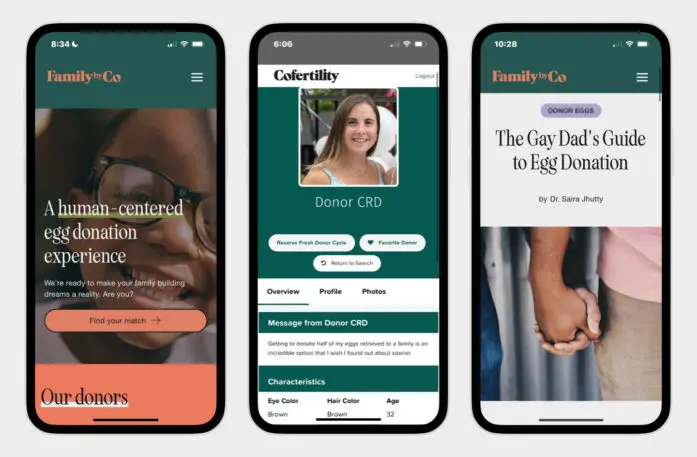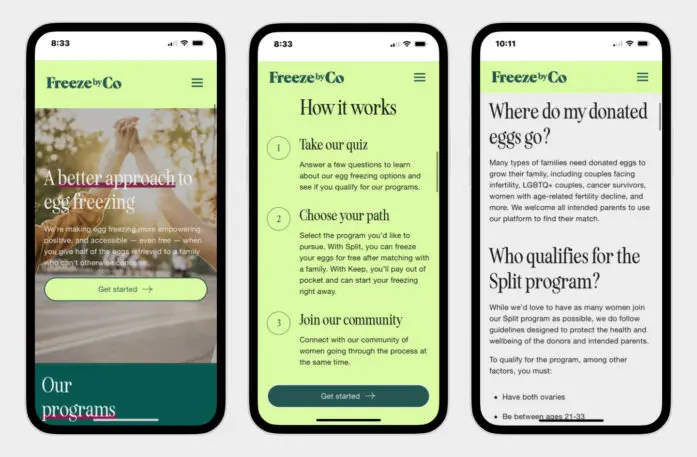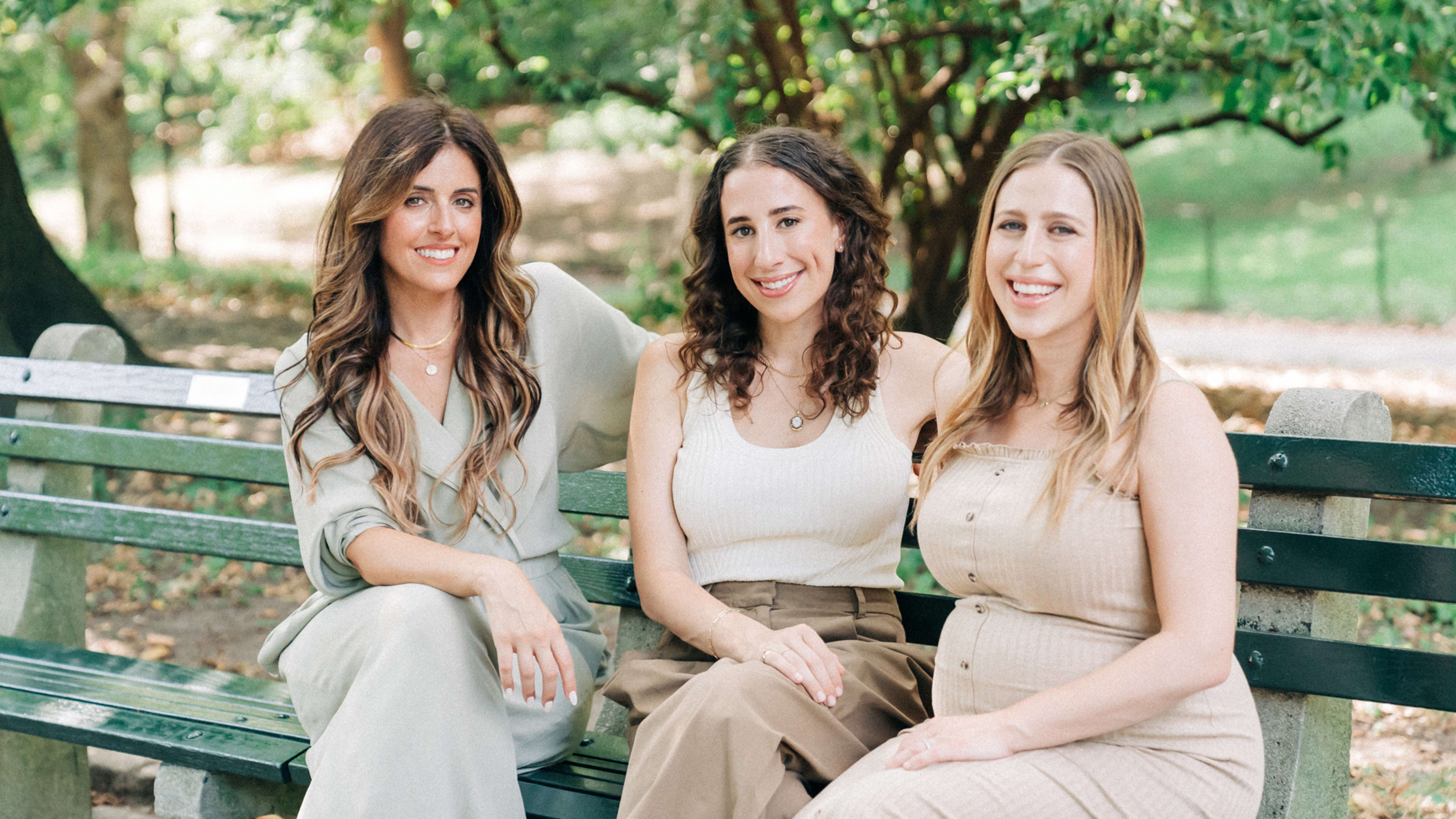It may seem like every employer is rolling out some type of fertility benefit these days, but that certainly wasn’t the case for Kristen. As an employee at a period-care brand, Kristen—who asked to use only her first name to protect her privacy—didn’t have any kind of coverage for egg freezing or fertility treatments through her company. At 26, she was still young, but she wasn’t planning on having kids anytime soon. And after hearing about the fertility issues that her friends and colleagues had faced, she started looking into freezing her eggs. “The barrier [was] balancing how much of a priority it was for [me and my husband] right now with the costs,” she says. “We were kind of at a standstill, where it didn’t feel like it was right for us yet.”
Then she saw an Instagram ad for Cofertility, a company that wants to make egg freezing more affordable and accessible by linking it to egg donation. A large portion of frozen eggs end up going unused and may eventually be discarded. Through Cofertility, Kristen could not only freeze her eggs, but also help support a family that was struggling to conceive—something she had always wanted to do. “Freezing eggs is not a done deal—that doesn’t mean you’re 100% getting a baby in the future,” she says. “So not having to pay out of pocket for that does relieve some of the pressure. And [you] also have the great opportunity to donate your eggs and hopefully help someone else on their fertility journey.”
Egg freezing is just one piece of the puzzle. Cofertility’s founders—all of whom have faced fertility challenges—are trying to build a new model of egg donation, which has traditionally been anonymized and tied to compensation. When someone freezes their eggs through Cofertility, they can do so for free if they choose to donate half of them through the Split program (assuming they meet the eligibility requirements for egg donors, which align with guidelines from the American Society for Reproductive Medicine). “We’re really bringing egg freezing and egg donation together because you can’t have one without the other,” says Lauren Makler, cofounder and CEO of Cofertility and the former founder of Uber Health. Makler is building Cofertility alongside Arielle Spiegel (who created a prior iteration of Cofertility as a fertility education platform), and Halle Tecco, the founder of Natalist and Rock Health.

Makler argues that Cofertility’s model has a broader appeal for potential egg donors and could foster a more diverse pool of candidates for intended parents. While people are drawn to egg donation for the financial incentives—you can typically receive up to $10,000 for one donation cycle—it also carries a stigma for other potential donors. “That’s a missed opportunity because at its core, egg donation is someone doing something good and providing a life-altering opportunity for a family,” Makler says. “This stigma is a problem on multiple fronts. It discourages women from helping a family grow, when that might be something they want to do. It leaves intended parents without options, and it especially hurts the LGBTQ community that needs to rely on egg donation for family planning.”
At the moment, most intended parents are forced to wade through a complex assemblage of egg donation agencies, each of which offers varying degrees of information about potential candidates to preserve anonymity. “It’s a hugely fragmented space,” says Chirag, an intended parent who’s currently working with Cofertility to find a donor. “There [are] a couple of meta search agencies that sit on top to try to aggregate the market. But at the end of the day, it’s a pretty impersonal process.” After Chirag and his husband thought they had found two strong donor options, they did their own research and actually discovered factual inaccuracies in their profiles. “This really felt like a pay-to-play kind of industry, where if you have unlimited economic resources, you can find exactly what you want,” Chirag says.
With the advent of DNA testing, traditional egg donation agencies can no longer guarantee true anonymity. Some parents, like Chirag, are actually more comfortable knowing who the donor is, and research shows that this can be beneficial to donor-conceived children as well. (Many of them also express discomfort with the financial compensation associated with traditional egg donation.) That’s why Cofertility has adopted a more open, transparent process that involves a lengthy application and allows the donor and intended parents to meet before moving forward. Through Cofertility, Chirag and his husband have already found multiple strong candidates who he says are a far better match than any of the donors they found through agencies.

For this model to work, however, Cofertility needs to scale its donor pipeline—not a small feat amid the crowded marketplace for egg freezing. So far, Cofertility has vetted and approved more than 50 egg donors, and more than a thousand people have submitted applications for consideration. With its official launch today—and a $5 million seed round led by Initialized Capital and Brit Morin’s Offline Ventures, rounded out with a slate of female angel investors—the company hopes to cast a wider net and also bring more intended parents onto the platform.
To deliver on the promise of expanding access to egg freezing, Cofertility also will have to get its product in front of the folks who need it most. That’s one reason Cofertility is focused on catering to a consumer audience—at least for now—even as fertility benefits in the workplace have grown increasingly popular. “It’s a great thing when companies offer fertility coverage,” Makler says. “But unfortunately, it’s typically confined to the companies that can afford it, so that’s typically larger corporations that generally already have advantaged employees in terms of access and compensation.” (It’s worth noting that there are additional charges associated with egg freezing even if the initial procedure is free, including egg storage and the potential cost of doing IVF down the road.)
By removing the incentive of cash compensation and tying donation to egg freezing, Makler believes Cofertility can crack an untapped pool of potential donors—both people who may never have considered egg donation before and others like Kristen, who may have been interested but were put off by the transactional nature of the process. For some of Cofertility’s donors, it was also important to see that its founders all intimately understood the problem they’re hoping to solve. “What we’ve heard from some folks is that they just didn’t find the right fit,” Makler says. “I think because we’ve been through it, and we’re willing to tell our story, and be right there with them, and invite them into this community, [they] feel more supported.”
Recognize your brand’s excellence by applying to this year’s Brands That Matter Awards before the early-rate deadline, May 3.
